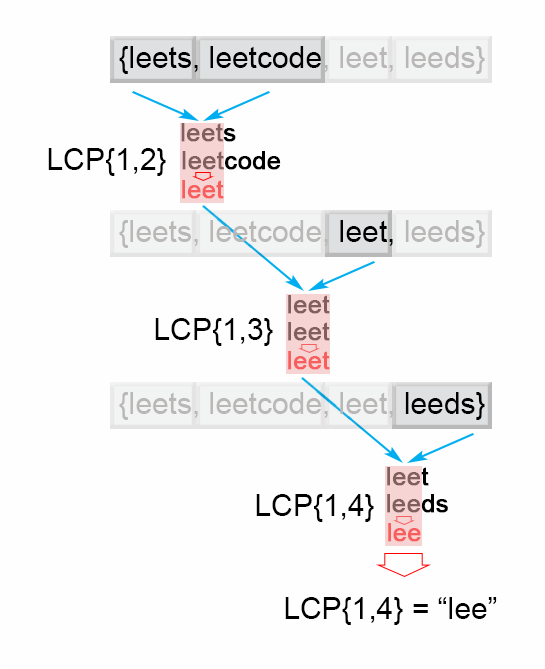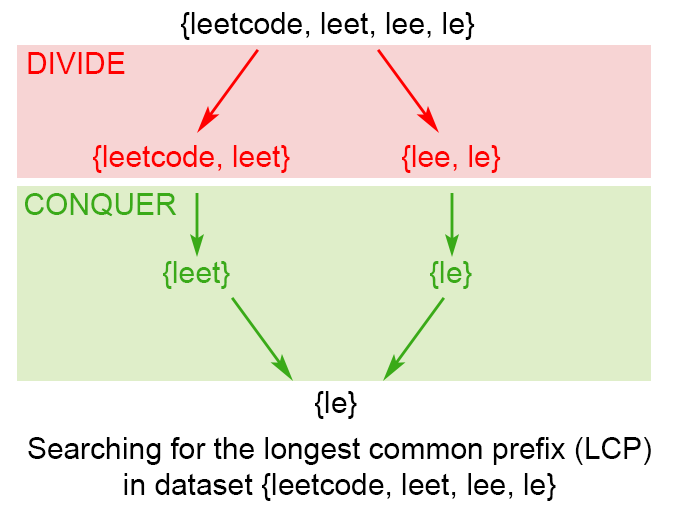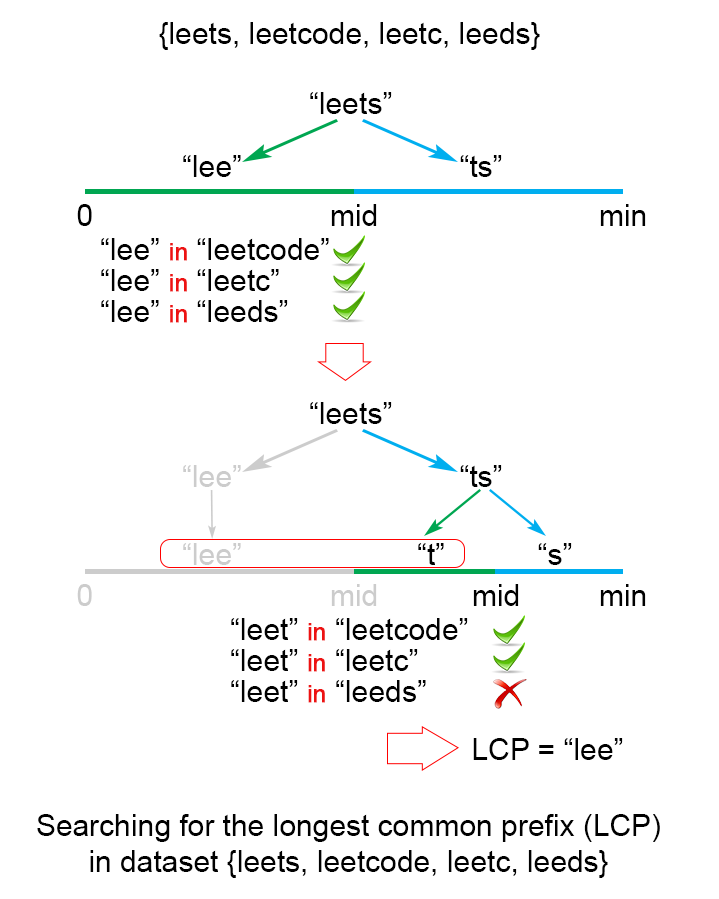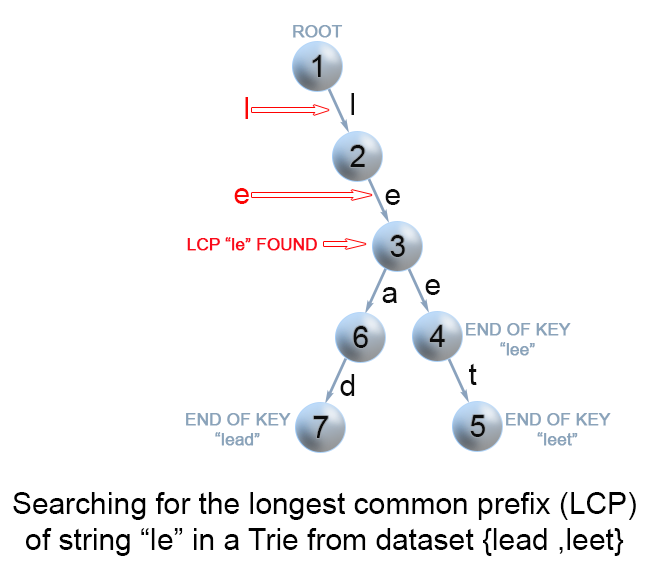Write a function to find the longest common prefix string amongst an array of strings.
Quick Navigation
Solution
Approach #1 (Horizontal scanning)
Intuition
For a start we will describe a simple way of finding the longest prefix shared by a set of strings \(LCP(S_1 \ldots S_n)\). We will use the observation that :
LCP(S_1 \ldots S_n) = LCP(LCP(LCP(S_1, S_2),S_3),\ldots S_n)
Algorithm
To employ this idea, the algorithm iterates through the strings [S_1 \ldots S_n], finding at each iteration i the longest common prefix of strings LCP(S_1 \ldots S_i)When LCP(S_1 \ldots S_i) is an empty string, the algorithm ends. Otherwise after n iterations, the algorithm returns LCP(S_1 \ldots S_n).

Figure 1. Finding the longest common prefix (Horizontal scanning)
Java
public String longestCommonPrefix(String[] strs) { if (strs.length == 0) return ""; String prefix = strs[0]; for (int i = 1; i < strs.length; i++) while (strs[i].indexOf(prefix) != 0) { prefix = prefix.substring(0, prefix.length() - 1); if (prefix.isEmpty()) return ""; } return prefix; }
Complexity Analysis
- Time complexity : O(S) , where S is the sum of all characters in all strings.
In the worst case all n strings are the same. The algorithm compares the string S1 with the other strings [S_2 \ldots S_n] There are S character comparisons, whereS is the sum of all characters in the input array.
- Space complexity : O(1). We only used constant extra space.
Approach #2 (Vertical scanning)
Algorithm
Imagine a very short string is at the end of the array. The above approach will still do S comparisons. One way to optimize this case is to do vertical scanning. We compare characters from top to bottom on the same column (same character index of the strings) before moving on to the next column.
Java
public String longestCommonPrefix(String[] strs) { if (strs == null || strs.length == 0) return ""; for (int i = 0; i < strs[0].length() ; i++){ char c = strs[0].charAt(i); for (int j = 1; j < strs.length; j ++) { if (i == strs[j].length() || strs[j].charAt(i) != c) return strs[0].substring(0, i); } } return strs[0]; }
Complexity Analysis
- Time complexity : O(S) , where S is the sum of all characters in all strings. In the worst case there will be n equal strings with length m and the algorithm performs S = m*n character comparisons. Even though the worst case is still the same as Approach #1, in the best case there are at most n*minLencomparisons where minLen is the length of the shortest string in the array.
- Space complexity : O(1). We only used constant extra space.
Approach #3 (Divide and conquer)
Intuition
The idea of the algorithm comes from the associative property of LCP operation. We notice that : LCP(S_1 \ldots S_n) = LCP(LCP(S_1 \ldots S_k), LCP (S_{k+1} \ldots S_n)) , where LCP(S_1 \ldots S_n) is the longest common prefix in set of strings [S_1 \ldots S_n] , 1 < k < n
Algorithm
To apply the observation above, we use divide and conquer technique, where we split the LCP(S_i \ldots S_j) problem into two subproblems LCP(S_i \ldots S_{mid}) and LCP(S_{mid+1} \ldots S_j), where mid is \frac{i + j}{2}. We use their solutions lcpLeft and lcpRight to construct the solution of the main problemLCP(S_i \ldots S_j). To accomplish this we compare one by one the characters of lcpLeft and lcpRight till there is no character match. The found common prefix of lcpLeft and lcpRight is the solution of the LCP(S_i \ldots S_j).

Figure 2. Finding the longest common prefix of strings using divide and conquer technique
Java
public String longestCommonPrefix(String[] strs) { if (strs == null || strs.length == 0) return ""; return longestCommonPrefix(strs, 0 , strs.length - 1); } private String longestCommonPrefix(String[] strs, int l, int r) { if (l == r) { return strs[l]; } else { int mid = (l + r)/2; String lcpLeft = longestCommonPrefix(strs, l , mid); String lcpRight = longestCommonPrefix(strs, mid + 1,r); return commonPrefix(lcpLeft, lcpRight); } } String commonPrefix(String left,String right) { int min = Math.min(left.length(), right.length()); for (int i = 0; i < min; i++) { if ( left.charAt(i) != right.charAt(i) ) return left.substring(0, i); } return left.substring(0, min); }
Complexity Analysis
In the worst case we have n equal strings with length m
-
Time complexity : O(S), where S is the number of all characters in the array, S = m*n Time complexity is T(n) = 2 T(\frac{n}{2}) + O(m). Therefore time complexity is O(S). In the best case this algorithm performs O(minLen*n) comparisons, where minLen is the shortest string of the array
-
Space complexity : O(m*log(n))
There is a memory overhead since we store recursive calls in the execution stack. There are log(n) recursive calls, each store need m space to store the result, so space complexity is O(m*log(n))
Approach #4 (Binary search)
The idea is to apply binary search method to find the string with maximum value L, which is common prefix of all of the strings. The algorithm searches space is the interval (0 \ldots minLen), where minLen is minimum string length and the maximum possible common prefix. Each time search space is divided in two equal parts, one of them is discarded, because it is sure that it doesn't contain the solution. There are two possible cases: S[1...mid] is not a common string. This means that for each j > i S[1..j] is not a common string and we discard the second half of the search space. S[1...mid] is common string. This means that for for each i < j S[1..i] is a common string and we discard the first half of the search space, because we try to find longer common prefix.

Figure 3. Finding the longest common prefix of strings using binary search technique
Java
public String longestCommonPrefix(String[] strs) { if (strs == null || strs.length == 0) return ""; int minLen = Integer.MAX_VALUE; for (String str : strs) minLen = Math.min(minLen, str.length()); int low = 1; int high = minLen; while (low <= high) { int middle = (low + high) / 2; if (isCommonPrefix(strs, middle)) low = middle + 1; else high = middle - 1; } return strs[0].substring(0, (low + high) / 2); } private boolean isCommonPrefix(String[] strs, int len){ String str1 = strs[0].substring(0,len); for (int i = 1; i < strs.length; i++) if (!strs[i].startsWith(str1)) return false; return true; }
Complexity Analysis
In the worst case we have n equal strings with length m
- Time complexity : O(S*log(n)), where S is the sum of all characters in all strings.
The algorithm makes log(n) iterations, for each of them there are S = m*n comparisons, which gives in total O(S*log(n)) time complexity.
- Space complexity : O(1).
We only used constant extra space.
Further Thoughts / Follow up
Let's take a look at a slightly different problem:
Given a set of keys S = [S_1,S_2 \ldots S_n], find the longest common prefix among a string
qand S. This LCP query will be called frequently.
We could optimize LCP queries by storing the set of keys S in a Trie. For more information about Trie, please see this article Implement a trie (Prefix trie). In a Trie, each node descending from the root represents a common prefix of some keys. But we need to find the longest common prefix of a string q and all key strings. This means that we have to find the deepest path from the root, which satisfies the following conditions: it is prefix of query string q each node along the path must contain only one child element. Otherwise the found path will not be a common prefix among all strings. * the path doesn't comprise of nodes which are marked as end of key. Otherwise the path couldn't be a prefix a of key which is shorter than itself.
Algorithm
The only question left, is how to find the deepest path in the Trie, that fulfills the requirements above. The most effective way is to build a trie from [S_1 \ldots S_n]strings. Then find the prefix of query string q in the Trie. We traverse the Trie from the root, till it is impossible to continue the path in the Trie because one of the conditions above is not satisfied.

Figure 4. Finding the longest common prefix of strings using Trie
Java
public String longestCommonPrefix(String q, String[] strs) { if (strs == null || strs.length == 0) return ""; if (strs.length == 1) return strs[0]; Trie trie = new Trie(); for (int i = 1; i < strs.length ; i++) { trie.insert(strs[i]); } return trie.searchLongestPrefix(q); } class TrieNode { // R links to node children private TrieNode[] links; private final int R = 26; private boolean isEnd; // number of children non null links private int size; public void put(char ch, TrieNode node) { links[ch -'a'] = node; size++; } public int getLinks() { return size; } //assume methods containsKey, isEnd, get, put are implemented as it is described //in https://leetcode.com/articles/implement-trie-prefix-tree/) } public class Trie { private TrieNode root; public Trie() { root = new TrieNode(); } //assume methods insert, search, searchPrefix are implemented as it is described //in https://leetcode.com/articles/implement-trie-prefix-tree/) private String searchLongestPrefix(String word) { TrieNode node = root; StringBuilder prefix = new StringBuilder(); for (int i = 0; i < word.length(); i++) { char curLetter = word.charAt(i); if (node.containsKey(curLetter) && (node.getLinks() == 1) && (!node.isEnd())) { prefix.append(curLetter); node = node.get(curLetter); } else return prefix.toString(); } return prefix.toString(); } }
Complexity Analysis In the worst case query q has length m and it is equal to all n strings of the array.
- Time complexity : preprocessing O(S), where S is the number of all characters in the array, LCP query O(m)
Trie build has O(S) time complexity. To find the common prefix of q in the Trie takes in the worst case O(m).
- Space complexity : O(S)
We only used additional S extra space for the Trie.
Analysis written by: @elmirap.
 最长公共前缀算法
最长公共前缀算法





 本文介绍四种高效查找字符串数组中最长公共前缀的方法,包括水平扫描、垂直扫描、分治及二分搜索策略,并探讨使用Trie树进行优化。
本文介绍四种高效查找字符串数组中最长公共前缀的方法,包括水平扫描、垂直扫描、分治及二分搜索策略,并探讨使用Trie树进行优化。
















 260
260

 被折叠的 条评论
为什么被折叠?
被折叠的 条评论
为什么被折叠?








